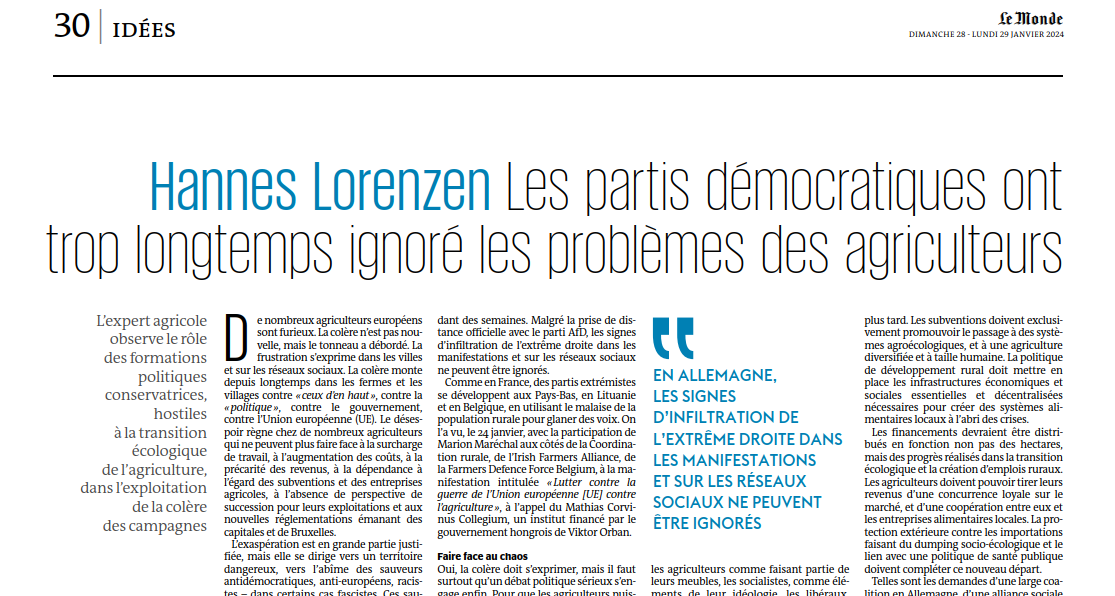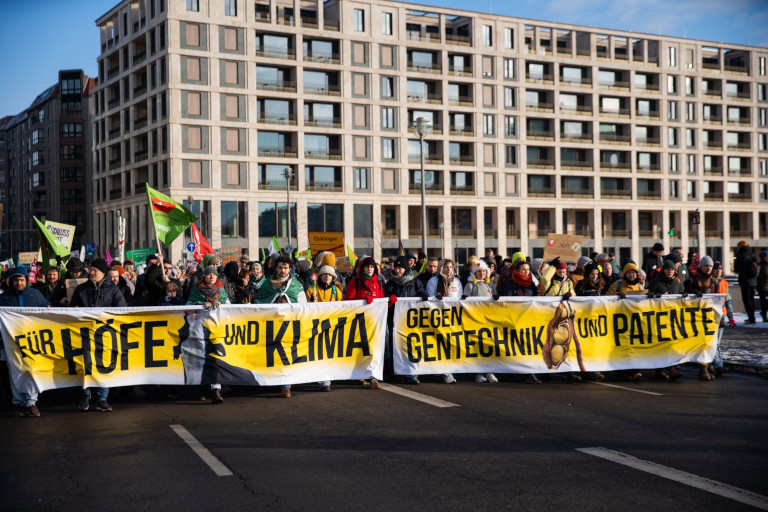The anger of Europe’s farmers is largely justified, but it is heading for dangerous territory. A transition to agroecology is urgently needed in the interests of all farmers. Op-ed by ARC2020 President Hannes Lorenzen, originally published in Le Monde.
Europe’s farmers are angry. The anger is not new, but the barrel has overflowed. The frustration is being vented in the cities and on social networks. On the farms and in the villages, anger has long been growing towards “those up there”, “the politicians”, “the government” and “the EU”. There is despair on many farms because they simply can no longer cope with the work overload, rising costs, insecure income, dependence on subsidies and agricultural companies, the lack of prospects for farm succession – and many new regulations from the capitals and Brussels.

The anger is largely justified, but it is heading for dangerous territory, towards the precipice of anti-democratic, anti-European, racist – in some cases fascist – saviours. These well-funded deniers of reality are on the rise because they offer the easiest answers. Everything must go. The government, the EU, the environmentalists, preferably the climate crisis too. Ever larger parts of Europe’s rural population and entire countries such as Hungary and, to a certain extent, Italy are already on this terrain – Trump country no longer seems far away.
In Germany, the governing coalition of Social Democrats, Greens and Liberals (the AMPEL coalition) has set thousands of tractors rolling by cancelling subsidies for agricultural diesel. At the beginning of January, the German Farmers’ Association (DBV) called for demonstrations “the likes of which Germany has never seen before”, as its president Joachim Rukwied threatened before Christmas. Road closures organised by the DBV at motorway slip roads and sensitive junctions have been disrupting traffic in many cities for weeks. Despite the official distancing from the far-right AFD, the signs of far-right infiltration of the demonstrations, particularly in social networks, cannot be overlooked.
As in France, extremist parties are also developing in the Netherlands, Spain, Italy, Lithuania and Belgium, capitalising on the frustration of the rural population to gather votes. This was evident on 24 January, when Marion Maréchal, together with the Coordination rurale, the Irish Farmers Alliance and the Farmers Defence Force Belgium, took part in the demonstration for “Fight the EU’s war on agriculture!” which was organised by the Mathias Corvinus Collegium (MCC), a far-right think tank massively financed by Viktor Orban.
Warm words without concrete measures
Yes, the anger must come out, but above all a serious political debate must finally get underway. To enable farmers to cope with the climate chaos and price volatility, a legal framework that promotes socially just, environmentally and climate-friendly agriculture must be created as a matter of urgency. The transition to agroecology is also necessary for Europe’s food security and must be promoted and supported. So far, COPA-COGECA, the lobby of the European majority farmer organisations, has prevented the agricultural transition together with the conservatives and the extreme right in the European Parliament. This became clear during the vote on the CAP reform: those who today present themselves as saviours of agriculture voted in favour of the privileges of large farms, the interests of the agricultural industry and free trade agreements.
The established democratic parties have ignored the problems of farmers for far too long. The Conservatives regarded farmers as part of their furniture, the Socialists and Social Democrats as part of their ideology, the Liberals as an outdated model and the Greens as stubborn resisters of the agroecological transformation. In times of crisis, business as usual is counterproductive. Warm words, understanding without political commitment, announcements without concrete measures achieve nothing except to increase anger. If, as in Germany, the Green Minister of Agriculture fails to make the National Strategic Plan of the Common Agricultural Policy fit for an ambitious agricultural turnaround right at the beginning of his term of office, even full-bodied promises to help small farmers now are of no use.
Promises are no longer enough
In the year of the European elections, visionary promises and announcements of dialogue are no longer enough. Commission President von der Leyen is promising a new Strategic Dialogue on Agriculture, although she has already caved in to the agricultural industry on many aspects of the Green Deal, including the Nature Restoration Act, the reduction of pesticide use and the development of a sustainable food system in the Farm to Fork strategy.
In the interests of all farmers, the project of a consistent agricultural transition must be in place by 2025 at the latest. Subsidies should exclusively promote the transition to agroecological systems and diversified, small-scale farming. Rural development policy must build the essential and decentralised economic and social infrastructure needed to create crisis-proof local food systems. Funding should not be allocated according to hectares, but according to progress in ecological transition and rural job creation. Farmers should be able to derive their income from fair competition on the market and from co-operation with local food businesses. External protection against socio-ecologically dumped imports and a link to a health policy must accompany this new beginning.
These are also the demands of a broad coalition in Germany, a social alliance of over 50 organisations that organises joint debates and campaigns every year at the Green Week in Berlin. Under the motto “We are fed up!”, six thousand people once again made it clear in Berlin on 20 January that creativity, tolerance and European cooperation are the best recipe against anger and despair in times of crisis.
This op-ed was originally published in French by Le Monde on 27 January 2024.





